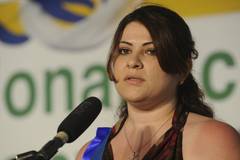In highly violent communities, peace advocates hold out hope
As peace advocates from around the world relayed heartrending stories of violence and oppression, they also expressed their ongoing hope that a movement of peace will prevail during the proceedings of the second day of the International Ecumenical Peace Convocation (IEPC) being held in Kingston, Jamaica.
The advocates included religious leaders from the Middle East, India, Brazil and the USA addressed the issue of violence from the perspective and need for peace within communities and strengthening the dignity and rights of all.
“As a woman, I believe we cannot have justice in the community without having it first in the safe haven of our church," said Dr Muna Mushahwar, a medical doctor who is a Palestinian Christian from Jerusalem.
She is intimately acquainted with being at the receiving end of displacement, denial and oppression which hits women particularly hard. "The church has a huge role and must take responsibility in stopping the mis-interpretation of Scripture that allows the injustice being committed against the Palestinian people and justifies it," she said.
Dr Deborah Weissman, who also lives in Jerusalem and serves as president of the International Council of Christians and Jews broadened the issue beyond the church saying that some faith communities seize on “absolute truths” and leave no room for questioning authority.
“Throughout the world today, in the name of religion, atrocities have been committed. In many places, there is an unholy alliance between faith and extreme violence,” she said.
Violence does not take place in a vacuum, pointed out Prof. Ram Puniyani, a writer-activist known for his relentless struggle to uphold the secular ethos of India.
“Violence takes places because a large section of society is indoctrinated with a hatred for others. They basically aim to abolish the human rights of the weaker section of societies.”
Asha Kowtal, a Dalit activist and the leader of a female empowerment movement in India, also spoke about the role of peace in improving women's lives in her home country. “Today hundreds of young girls are sexually abused by the dominant caste men,” she said.
The caste system is considered by many to be the largest systemic human rights violation anywhere in the world today. “It results in discrimination and exclusion,” said Kowtal.
As people at the bottom are continually denied access to opportunities and resources, “they remain the poorest of poor, most unemployed, most hated and most vulnerable,” she said.
Discrimination causes violence
People in Brazil also face discrimination that causes violent conflict, said Dr Tania Mara Vieira Sampaio, a professor at the Catholic University of Brasilia.
“In Brazil, as in the rest of Latin America, to have access to a university is a privilege that only few people can afford,” she said. “Our struggle to overcome the sacrifice-driven logics of the market today and enable a more condign life for everybody also has implications on the formation of the younger generations.”
Martin Luther King III, of Atlanta, Georgia and eldest son of slain civil rights leader Martin Luther King Jr., said churches need to do a better job of promoting peace in the community.
“Despite great progress, the 11 a.m. Sunday morning worship hour is still the most segregated hour of the day,” said King. “Today, as we all strive to affirm the dignity and rights of humankind, many tenacious forms of discrimination continue to undermine the basic respect for human rights.”
From a Christian perspective, the teachings of Jesus are deeply rooted in nonviolence, he said, but peace advocacy should be the responsibility of people from all spiritual traditions.
“The teachings of Jesus are deeply rooted in nonviolence but I believe that all faiths can have a mandate for nonviolence in all of the holy scriptures.”
During the next several days the IEPC will also explore peace with the earth, peace in the marketplace and peace among peoples. The convocation, which is organized by the World Council of Churches, the Caribbean Conference of Churches and the Jamaica Council of Churches concludes on Tuesday, 24 May.
For live video streaming of the plenaries visit the IEPC website:
High resolution photos of the event may be requested free of charge via photos.oikoumene.org




